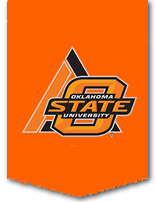New food safety option available through OSU food science degree
State-of-the-art food industry equipment at the Oklahoma State University Robert M. Kerr Food and Agricultural Products Center allow OSU students to gain important hands-on knowledge about the food sciences. (Photo by Todd Johnson)
STILLWATER, Okla. – A new food safety degree option available through Oklahoma State University’s College of Agricultural Sciences and Natural Resources will provide widespread benefits, from students looking toward a viable career to the food industry and consumers.
Offered as a degree option for food science majors in the OSU Department of Animal Science, the undergraduate program will provide students with a diverse, comprehensive curriculum and hands-on experiences that make for well-rounded and much-sought-after food industry professionals.
“There is a huge demand for individuals who are specialized in food safety in the food processing sector,” said Ravi Jadeja, assistant professor and food safety specialist. “Students who earn an OSU food science degree with a food safety option will possess both the necessary knowledge and essential food safety certifications.”
Students will learn from award-winning faculty and take courses in the Robert M. Kerr Food and Agricultural Products Center, part of the OSU Division of Agricultural Sciences and Natural Resources. FAPC is known throughout the nation for its state-of-the-art facilities.
Clint Rusk, head of the department of animal science, believes students will benefit greatly from the well-rounded program of study and be better equipped to ultimately transition from their educational experience into a professional position in their chosen career field.
“Many students aren’t aware of the opportunities available to them in the food science arena,” he said. “We may have to recruit heavily to begin with, but we expect more and more students to proactively ask about the option as word spreads about the variety and number of jobs available to graduates.”
Cynda Clary, CASNR associate dean of academic programs, added the food safety option is a good example of the college’s emphasis on providing a positive and relevant student experience.
“We strive to offer majors and options that challenge our students and allow them to grow academically and personally,” she said. “The new food safety option will provide our students a high-quality education taught by exceptional faculty who excel in their respective teaching, research and Extension appointments.”
The ability of CASNR to draw upon knowledge gained through the division’s two state agencies helps ensure students receive educational experiences grounded in real-world skill building and problem solving, said Thomas Coon, DASNR vice president, dean and director.
“Our land-grant mission is, at its core, about adding value to people’s lives,” he said. “Through our statewide Oklahoma Agricultural Experiment Station and Oklahoma Cooperative Extension Service agencies, our scientists and educators actively interact with and work side-by-side with people at the local, regional, national and international levels to solve issues and concerns of importance to them, their families and their communities.”
As part of the division, CASNR teaching faculty are well aware of ongoing research and Extension efforts, making them particularly well-positioned to take the most up-to-date, science-based knowledge available and put it to use in classroom and laboratory settings where students can employ it.
“It’s one of our greatest strengths and a key element of providing students with timely, engaging and interactive learning experiences,” Clary said.
As the food safety program grows, CASNR’s goal is to expand the number of scholarships, internships, undergraduate research opportunities and career-development resources available to students.
“Though we live in an increasingly interdependent and complex global marketplace, the basic truth remains that everyone requires access to nutritious, safe, affordable food,” Clary said. “Those who are students today will be the ones making that possible in the years and decades ahead. Providing students with the best support system we can is an investment in everyone’s future, from those in the food industry to the consumer.”
FAPC Director Roy Escoubas agreed, explaining that adding an undergraduate food safety degree option at OSU has been discussed for several years, with input garnered from food industry professionals.
“Our FAPC Advisory Board has spoken with us about the need on a number of occasions, and they are pleased OSU will now be among the first universities to offer this in-demand degree option,” he said.
John Griffin, president and CEO of Griffin Foods in Muskogee, Oklahoma and spokesperson for the FAPC Advisory Board, is one of those excited to see the academic option come to fruition at OSU.
“Now food manufacturers can invest their money to hire a qualified food safety specialist from OSU instead of investing their time and money to train someone in food safety,” Griffin said.
The Oklahoma State Regents for Higher Education approved the new CASNR food safety degree option on April 9.
###
REPORTERS:
Donald Stotts and Mandy Gross contributed to this article
MEDIA CONTACT:
Donald Stotts
DASNR News and Media Relations
Agricultural Communications Services
143 Agriculture North
Oklahoma State University
Stillwater, OK 74078
Phone: 405-744-4079
Fax: 405-744-5739
Email: donald.stotts@okstate.edu
The OSU College of Agricultural Sciences and Natural Resources believes in the value of hands-on education and the importance of having a well-rounded student experience. Our award-winning faculty members are dedicated to developing students and passionate about adding value to the total educational experience. With 16 majors and 61 study options, plus more than 60 student organizations, the college is committed to expanding minds and inspiring purpose. Learn more at casnr.okstate.edu.


